Module7Unit3教学案
七年级英语下册Module7MypastlifeUnit3Languageinuse教案新版外研版

Unit 3 Language in use课题Module 7 My past life 第三课时Unit 3 Language in use 课型Revision教学目标知识目标1.复习并掌握以下词汇:yesterday, born, strict, friendly, primary school, town, US,village, nice, good, difficult, bathroom, bedroom, garden...2.掌握以下句型:①I was born in Quincy.② My first teacher was Mrs Lane.③I wasn’t born in Quincy.④—Were you difficult in class too?—No, I wasn’t.⑤Where were you born?能力目标能够用动词be的过去式描述自己和他人过去的生活或经历情感目标通过对过去童年或家乡的描述,产生对家乡和美好生活的热爱教学重点1.Grasp the words and the expressions in this module2.Grasp how to describe one’s own and others’ past life教学难点1.Grasp the past tense form of the irregular verbs2.Describe one’s own and other’s past life课前预习Preview the new words教学方法Situational approach; Listening and speaking approach;Communicative approach教学过程教学环节教师活动学生活动备课札记Step 1 Revision and lead in Show students theseimportant sentences:I was born in Quincy.Look through theseimportant sentences andunderstand the use of be让学生们首先通过语境复习本模块所学重点语法:一般过去时My first teacher was MrsLane.I wasn’t born in Quincy.—Were you difficult inclass too?—No, I wasn’t.Where were you born?(was/were).Step 2 Grammar Let students go over thegrammar.一般过去时一、一般过去通常用于表达过去发生的事情。
八年级英语下册M7SummeUnit3La教案(含教学反思新版外研版
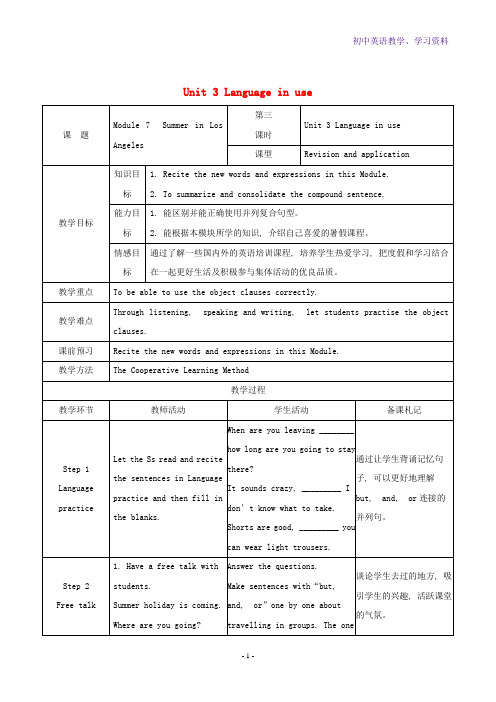
能力目标
1. 能区别并能正确使用并列复合句型。
2. 能根据本模块所学的知识, 介绍自己喜爱的暑假课程。
情感目标
通过了解一些国内外的英语培训课程, 培养学生热爱学习, 把度假和学习结合在一起更好生活及积极参与集体活动的优良品质。
谈论学生去过的地方, 吸引学生的兴趣, 活跃课堂的气氛。
Step 3
While-task
1. Let the students work in pairs, join the two parts of the sentences with “and, or, but”. Then say them out. (Activity 1)
1. Work in pairs, join the two parts of the sentences with “and, or, but”. Then say them out.
2. Work in groups, read and complete the passage with “and, but, or” in Activity 2. Check the answers.
并列复合句的基本结构: 简单句+并列连词+简单句
and→并列关系
or→选择关系
but→转折关系
Students summary
and→并列关系
or→选择关系
but→转折关系
引导学生对本模块语法进行总结, 培养学生自主学习, 自主总结的良好学习习惯。
续表
教学环节
教师活动
学生活动
备课札记
Step 6
外研社初一英语下册备课module7 unit3

---- What’s the most expensive way to travel ?
---- By plane .
几个特殊疑问词的运用
有
效
训
练
预
习
检
测
根据句意及首字母提示写出单词。
1.It’s b____to do the same work for a long time.
Step5Do exercises
plete the word map. Use these wordsin Activity 4.
plete the sentences with correct form of the adjectivesin Activity 5.
Step6Around the world
1.柳山镇中小学集体备课卡
科目English课时21年级七
课题
Module 7 Planes , boats and trains
Unit 3 Language in use
教
学
目
标
To summarise and consolidate superlatives and "by + means of transport "
4. It’s ten o’clock. All the students _______(have) a maths class.
5. –Where is your mother?
–She _______ (cook) in the kitchen..
6. I can _______(dance) and ________ (sing).
初中英语-八年级上册-Module 7 Unit 3-优质教学课件
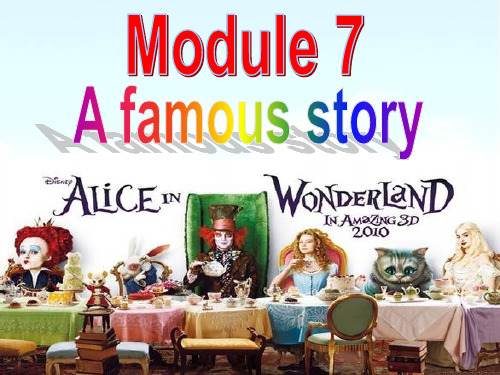
一般过去时和过去进行时的区别:
相同点:两者都表示过去发生的动作。
不同点:一般过去时表示过去的时间里发生的动作,往 往已经完成;过去进行时表示过去某一时刻或时段正在 进行的动作。 一般过去时的时间状语主要有: yesterday (morning, afternoon, evening), last night (week, month, year), ago, the day before yesterday, in 2003, just now, long long ago, one day等。
Then a white rabbit with (3) _p_i_n_k_ eyes ran by. There was nothing (4) _s_tr_a_n_g_e_ about that. Then the rabbit took a watch out of its (5) _p_o_c_k_e_t and looked at it. Alice followed the rabbit and fell down a (6) _h_o_l_e_. Alice had a lot of adventures in Wonderland.
3. This time last year, __I_w__a_s_s_ta_y_i_n_g_ _a_t _m_y__g_r_a_n_d_p_a_r_e_n_t_s’_h__o_u_se__.
4. Last Saturday, from about 1 pm to 4 pm, _I_w_a_s__p_la_y_i_n_g__in__th_e__p_a_r_k_______.
1. The dog is _ru__n_n_in_g__a_f_te_r_ the cat in the garden. 2. _W__h_a_t_ is this machine _f_o_r_? 3. He _h_a_d_n_o_t_h_i_n_g_t_o_d__o_ and was very bored.
如何提高中学英语课文阅读教学的质量——兼评罗洁执教的Module7Unit3Reading一课
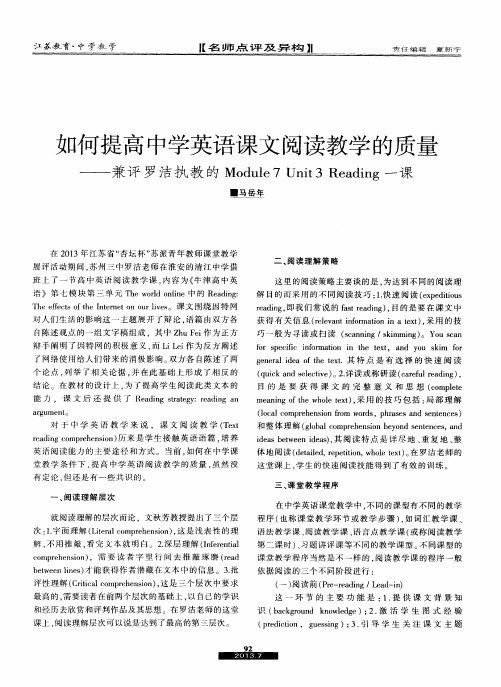
r e a d i n g , 即我们常说 的 f a s t r e a d i n g ) , 目的 是 要 在 课 文 中 获 得有关 信息 ( r e l e v a n t i n f o r m a t i o n i n a t e x t ) , 采 用 的 技 巧一 般 为 寻 读 或 扫 读 ( s c a n n i n g/ s k i m m i n g ) 。Y o u s c a n
苏教 育 ・ 中学苏 学
I 【 名 师 点 评 及 异 构 】 I
责仔编辑 夏新宇
如何提高 中学英语课 文 阅读教学 的质量
兼 评 罗 洁 执 教 的 Mo d u l e 7 Un i t 3 R e a d i n g一课
舅里量生
在 2 0 1 3年 江 苏 省 “ 杏坛杯 ” 苏 派 青 年 教 师 课 堂 教 学
( 1 o c a l c o mp r e h e n s i o n f r o m wo r d s , p h r a s e s a n d s e n t e n c e s )
对 于 中 学 英 语 教 学 来 说 .课 文 阅 读 教 学 ( T e x t
语 》第七模 块 第三单 元 T h e w o r l d o n l i n e中 的 R e a d i n g :
T h e e f f e c t s o f t h e I n t e r n e t o n o u r l i v e s 。 课 文 围绕 特 网
这 堂课 上 , 学 生 的快 速 阅读 技 能 得 到 了有 效 的训 练 。
三、 课 堂教 学程 序
r e a d i n g c o m p r e h e n s i o n ) 历来是 学生接触英语 语篇 . 培 养 英 语 阅 读 能 力 的 主 要 途 径 和 方 式 。当 前 , 如 何 在 中学 课 堂 教 学 条件 下 , 提 高 中学 英 语 阅 读 教 学 的 质 量 , 虽 然 没
Module7Unit3外研版英语九年级上册单元教案
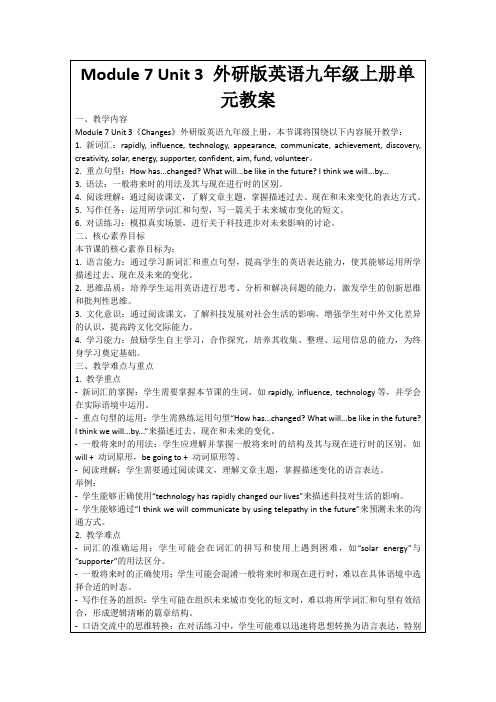
实践活动环节,分组讨论和成果展示进行得相当顺利。学生们在讨论中积极发表自己的见解,但在写作练习中,我发现部分学生在组织语言和表达思想方面还存在困难。为了提高他们的写作能力,我打算在下一节课中增加一些关于如何构建文章框架的指导。
-教师可以通过设置具体情境和提供关键词,帮助学生克服口语交流中的思维转换难题,例如,讨论“how technology might affect education in the next 10 years”。
四、教学流程
(一)导入新课(用时5分钟)
同学们,今天我们将要学习的是Module 7 Unit 3《Changes》这一章节。在开始之前,我想先问大家一个问题:“你们在日常生活中是否注意到了科技带来的变化?”比如,我们现在可以通过手机进行视频通话,这在以前是不可想象的。这个问题与我们将要学习的内容密切相关。通过这个问题,我希望能够引起大家的兴趣和好奇心,让我们一同探索科技进步对生活的影响。
五、教学反思
在今天的教学中,我发现学生们对Module 7 Unit 3《Changes》的学习表现出很高的热情。他们在讨论科技对生活的影响时,提出了很多有见地的观点,这让我感到很欣慰。但同时,我也注意到一些需要改进的地方。
在导入新课环节,通过提问的方式引发学生对科技进步的兴趣,这个方法效果不错,学生们都积极参与其中。然而,我意识到在引导学生们思考问题时,可以更加具体和深入,以便让他们更好地将问题与即将学习的内容联系起来。
2.教学难点
-词汇的准确运用:学生可能会在词汇的拼写和使用上遇到困难,如“solar energy”与“supporter”的用法区分。
外研版英语七年级下册Module7_Unit 3 第5课时单元教案与反思

Unit3第5课时人非圣贤,孰能无过?过而能改,善莫大焉。
《左传》原创不容易,【关注】店铺,不迷路!自主学习方案学生自学教材(P44~45)找出课文中的重点词组和句子。
完成教材(P46~47)的练习题。
课堂导学方案Step1情景导入教师要求学生熟读下面的语言训练。
(1)IwasborninQuincy.(2)ne.(3)Iwasn’tboredinQuincy.(4)—Wereyoudifficultinclasstoo?—No,Iwasn’t.(5)W’sw eekend?—Itwasn’t(benot)bad.(2)—Werettwo.环节说明:完成任务3和小结训练是巩固本节be动词一般过去时态的用法。
Step4完成教材4的任务1.用方框里单词和词组的适当形式填空。
2.小结训练。
(1)Teverymucfortable(comfort)ay1st1998或1stMay,1998。
2.ato→tomatoespotato→potatoes以o结尾的表示无生命事物的单词如photo,radio,piano等变复数时直接在末尾加“s”。
Step7家庭作业请完成模块7Unit3的练习题。
这一课时主要是教会学生用be动词的一般过去时态来谈论自己或者他人过去的生活等。
为了避免单调枯燥的课堂教学,提高学生学习的效果,在教学中教师可以引导学生将所学的语言运用到实际中。
如让学生们谈谈过去的生活。
“任务型”教学模式的运用,使学生有了明确的任务目标,他们主动参与课堂实践。
这样学生对于过去时态理解加深了,运用起来也更加得心应手了。
【素材积累】每个人对未来都有所希望和计划,立志是成功的起点,有了壮志和不懈的努力,就能向成功迈进。
1、立志多在少年,但宋朝文学家苏洵27岁开始发愤,立志就读,昼夜不息,结果大器晚成,终于成为唐宋八大家之一。
2、我国明代画家王冕,少年放牛时,立志要把荷花佳景惟妙惟肖地画出来。
他不分昼夜地绘画,立志不移,后来成为当时著名的画家。
外研版英语初一上册Module7Unit3教案
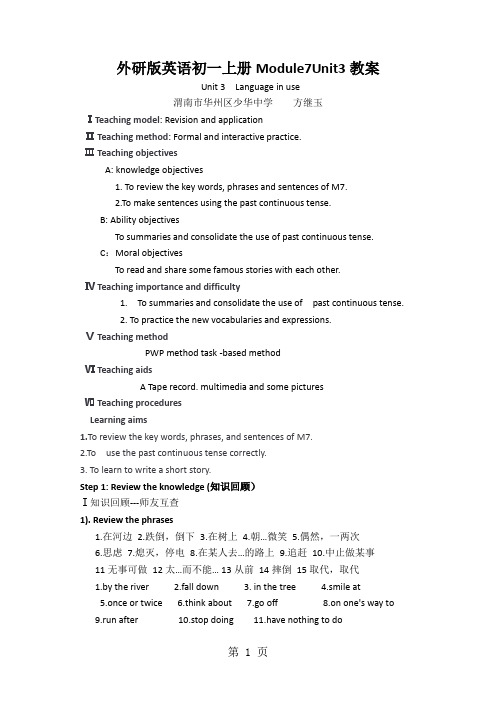
外研版英语初一上册Module7Unit3教案Unit 3 Language in use渭南市华州区少华中学方继玉ⅠTeaching model: Revision and applicationⅡ Teaching method: Formal and interactive practice.Ⅲ Teaching objectivesA: knowledge objectives1. To review the key words, phrases and sentences of M7.2.To make sentences using the past continuous tense.B: Ability objectivesTo summaries and consolidate the use of past continuous tense.C:Moral objectivesTo read and share some famous stories with each other.Ⅳ Teaching importance and difficulty1. To summaries and consolidate the use of past continuous tense.2. To practice the new vocabularies and expressions.Ⅴ Teaching methodPWP method task -based methodⅥ Teaching aidsA Tape record. multimedia and some picturesⅦ Teaching proceduresLearning aims1.To review the key words, phrases, and sentences of M7.2.To use the past continuous tense correctly.3. To learn to write a short story.Step 1: Review the knowledge (知识回顾)Ⅰ知识回顾---师友互查1). Review the phrases1.在河边2.跌倒,倒下3.在树上4.朝…微笑5.偶然,一两次6.思虑7.熄灭,停电8.在某人去…的路上9.追赶10.中止做某事11无事可做12太…而不能… 13从前14摔倒15取代,取代1.by the river2.fall down3. in the tree4.smile at5.once or twice6.think about7.go off8.on one's way to9.run after 10.stop doing 11.have nothing to do12.too...to 13.once upon a time 14.take the place of(师友先自己完成,再相互查抄)2). Review the important drills课文原句在现1.Alice was sitting with her sister by the river.2.It was sitting in a tree and smiling at everyone.3.It was too dark for her to see anything.4.While she was falling, she was thinking about her cat.5.It was very polite of you to sit down.6.They were having a tea party in the garden.7.Where was it going?Ⅰ知识回顾—2.西席点评已往举行时态:主语+was/ were+doing.Do--doing:1.一般环境直接加ing . talk--talking call--calling buy--buying.2 .以哑e末尾去饿加ing. take--taking3 以重读闭音节末尾,末尾只有一个子音字母,双写+ing. run--runningsit--sitting stop--stopping特殊:lie -- lyingStep 2 Explanation 题型讲解II.题型讲解—1.师友互讲1). Underline the correct words.1 Suddenly, all the lights in my house_________ . There was heavy rain outside.2 —I called you up at seven o’clock last night, but nobody answered it. —Really? I’m sorry, but I _____________ a piano lesson at school.3 —I ______you and Tom in the library just now.—Oh, we________________several visitors around the school.2).Write down what each member of your group was doing at eight o’clock last night. Sun Li was watching TV at eight o’clock last night.1___________________________________________2___________________________________________3___________________________________________4___________________________________________1 The dog is ___ the cat in the garden.2__________is this machine____________ ?3 He ______________ and was very bored.4 She is_____________how to finish the story.5 I wrote to him_________________ , but he did not answer.(师友自己练习,学友讲给师傅听,师傅改正错误,并说明原因,师傅帮助学友完善笔记)II.题型讲解—2.西席概括1.已往举行时与一般已往时的区别:一般已往时与已往举行时都是产生在已往。
外研版-英语-九上-九上Module7 3单元 教案 (3)

Module7 Unit3 精品教案【教学目标】本模块围绕英雄这一话题,开展听、说、读、写活动。
语法重点是操练被动语态。
语言技能和语言知识主要都是围绕名著这一中心话题展开。
语言知识目标让学生能够使用在本模块所学的单词和短语。
1. 语言技能目标通过状语从句的学习,学会总结和归纳。
2. 情感态度目标能虚心向他人学习,学会合作和分享。
【教学过程】Step 1 RevisionShow some pictures to review the text of Unit 1 and Unit 2Step 2 Language practice1. Read through the example sentences in the box with the whole class.1) Their works are still read by many people today.2) We’re still influenced by Confucius’s ideas.3) It is still read and loved by people all over the world.2. Ask the students to repeat the sentences in the box.Step 3 Work in pairs.Compare the sentences below with the sentences in the grammar box above.1. Many people still read their works today.2. Confucius’s ideas still influence us.3. People all over the world still read and love it.Step 4 Grammar被动语态(1)如果想要表达“孩子们喜爱这本书”,“我们每天使用电脑”,我们会说:Children love this book.We use computers every day.如果想要说“这本书为孩子们所喜爱”,“电脑天天都要使用到”,则可以这样表达:This book is loved by children.Computers are used (by us) every day.这两组句子表达的重点有所不同。
三年级英语上册 Module 3 Unit 7(巩固课)教案 广州版

广州市小学英语三年级上册Module 3 StationaryUnit 7 Where’s my pencil(巩固课)一、教学内容分析:本节课是Unit7的第二课时,学生在Unit7的第一个课时已经学习了有关文具的单词和主要句型Where’s my…?。
本节课主要是通过创设大量真实的情境,引导学生用学过的单词和句型在情景中运用,从而达到既能复习、巩固学过的知识,又能培养和提高学生综合语言运用能力的目的。
并通过引导学生对学习过的文具单词进行归类并启发他们发现一些规律来帮助他们记忆单词,为以后的单词学习和记忆进行一些学法指导。
二、教学目标:1.语言知识:1)复习并根据指令做出准确的动作: Show me your …2)复习、巩固、运用句型:Is it…?Yes, it is. / No, it isn’t.Where is my …?3)复习、巩固、运用和归纳所学过的文具类单词。
2.语言技能:1)能流利并准确的说出有关文具的单词,并尝试归纳记忆单词。
2)能理解并听懂有关指令,做出正确反应。
3)能用以上的句型在情境中进行简单地交流。
3.情感态度:4)在学习过程中学会小组合作,共同进步。
5)培养学生使用礼貌用语。
4.学习策略:6)创设情境,让学生在情境中运用学过的单词和句型进行交流,巩固对单词的理解和句型的运用。
7)引导学生观察、归纳和总结规律,在学习中去发现一些单词记忆的方法。
三、教学重、难点:重点:1)在情境中理解、巩固和运用单词和句型并归类记忆单词;2)能在真实的情境中运用单词和句型进行简单的表演。
难点:1)如何在真实的情景中运用语言;2)观察发现单词的一些规律来记忆单词。
主要教学媒体:文四、工具实物、图片、多媒体课件五、教学过程。
三年级下册英语说课稿-Module 7第三课时Unit 2 1~3 外研版(三起)
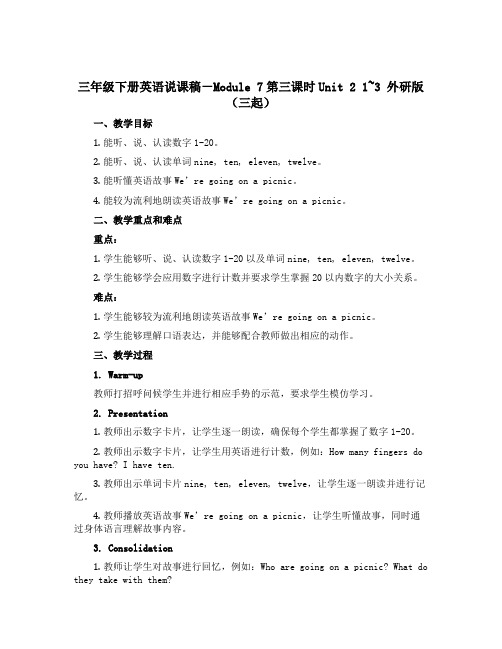
三年级下册英语说课稿-Module 7第三课时Unit 2 1~3 外研版(三起)一、教学目标1.能听、说、认读数字1-20。
2.能听、说、认读单词nine, ten, eleven, twelve。
3.能听懂英语故事We’re going on a picnic。
4.能较为流利地朗读英语故事We’re going on a picnic。
二、教学重点和难点重点:1.学生能够听、说、认读数字1-20以及单词nine, ten, eleven, twelve。
2.学生能够学会应用数字进行计数并要求学生掌握20以内数字的大小关系。
难点:1.学生能够较为流利地朗读英语故事We’re going on a picnic。
2.学生能够理解口语表达,并能够配合教师做出相应的动作。
三、教学过程1. Warm-up教师打招呼问候学生并进行相应手势的示范,要求学生模仿学习。
2. Presentation1.教师出示数字卡片,让学生逐一朗读,确保每个学生都掌握了数字1-20。
2.教师出示数字卡片,让学生用英语进行计数,例如:How many fingers do you have? I have ten.3.教师出示单词卡片nine, ten, eleven, twelve,让学生逐一朗读并进行记忆。
4.教师播放英语故事We’re going on a picnic,让学生听懂故事,同时通过身体语言理解故事内容。
3. Consolidation1.教师让学生对故事进行回忆,例如:Who are going on a picnic? What do they take with them?2.教师让学生用英语朗读故事We’re going on a picnic,要求学生较为流利地读出故事的内容。
3.教师出示数字卡片,让学生用英语读出数字,并比较数字大小。
4. Practice1.教师让学生两两组合进行英语交流,例如:How old are you? How many brothers and sisters do you have?2.教师利用口语表达和身体语言进行角色扮演游戏,让学生进行课内比赛。
2023-2024学年外研版七年级英语上册教案Module 7 Unit 3

Module 7 Computers Unit 3 Language in use知识目标单词keyboard, mouse, screen, connect, turn, turn on, learn, document, click, use, save,box, finally, print, paper词组connect…to…;switch on/ turn on the computer;on the computer ;open a newdocument;use the mouse句型I am the first computer in the world. I was born in 1946 in America. I'm verybig,about one and a half times the size ofa classroom.技能目标能听懂本课时的听力材料,能说出本课时的重要句型,能运用句式用英语谈论学习方法1.学习电脑方面的词汇以及一般现在时的特殊疑问句2.了解不同国家和地区的人们使用电脑的情况1.能就电脑的使用进行简单的问答2.较熟练地运用本模块中所学的词汇和句型,区别应用助动词do, doesStep 1 Greetings1.Greetings.2.含有行为动词的一般现在时的特殊疑问句的结构是“疑问词+一般疑问句语序(助动词用do或does)?”(疑问词作主语时除外)。
Ⅰ、Read through the sentences with the whole class.Ⅱ、Ask the students to match the questions with the answers in Activity 1 with a partner.Ⅲ、Call back the answers from the whole class, check the answers.Keys: 1. b 2. c 3. d 4. aⅣ、Now work in pairs.Ⅴ、Ask and answer the questions.1. Read through the example sentence.2. Ask the students to complete the conversations in Activity 2 with a partner.3. Call back the answers from the whole class, check the answers.4. Read through the sentences with the whole class.5. Ask the students to fill in the blank individually, then check with a partner.6. Call back the answers from the whole class, check the answers.7. Read the sentences together loudly.Ⅵ、Read through the words in the box with the whole class.Ⅶ、Ask the students to complete the sentences with the correct form of the words from the box. with a partner.Ⅷ、Call back the answers from the whole class, check the answers.Keys:1. checks2. use3. plan4. like5. talk1. Ask the students to look at the picture and discuss what they can see.Ⅸ、Read through the information with the whole class, and talk something about them.1. Work in groups of three. Write questions about students and computers.2. Work with the whole class. Make a survey about students and computers.1.—I'm waiting for the mail. Do you know ________it will arrive?—Usually it comes by 4:00 p.m.A.how B.whereC.when D.what2. —Where do you search for information?—________.A.Yes,the Internet B.No,the InternetC.On the Internet D.At any time答案:1.C 2.C完成请完成P62对应习题本课时以问答形式与学生互动来导入新课,引出课时的中心。
外研版初中英语八年级上册Module 7 Unit 3 Language in use语法复习运用研讨课教案附教学反思
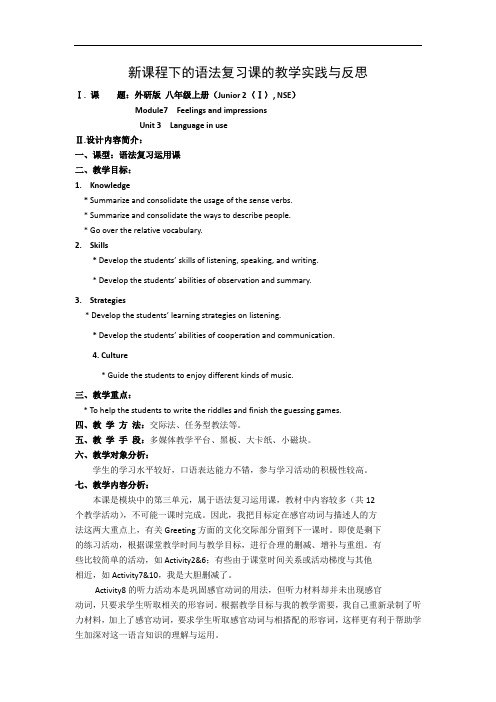
新课程下的语法复习课的教学实践与反思Ⅰ. 课题:外研版八年级上册(Junior 2〈Ⅰ〉, NSE)Module7 Feelings and impressionsUnit 3 Language in useⅡ.设计内容简介:一、课型:语法复习运用课二、教学目标:1.Knowledge* Summarize and consolidate the usage of the sense verbs.* Summarize and consolidate the ways to describe people.* Go over the relative vocabulary.2.Skills*Develop the students’ skills of listening, speaking, and writing.* Develop the students’ abilities of observation and summary.3.Strategies* Develop the students’ learning strategies on listenin g.*Develop the students’ abilities of cooperation and communication.4. Culture* Guide the students to enjoy different kinds of music.三、教学重点:* To help the students to write the riddles and finish the guessing games.四、教学方法:交际法、任务型教法等。
五、教学手段:多媒体教学平台、黑板、大卡纸、小磁块。
六、教学对象分析:学生的学习水平较好,口语表达能力不错,参与学习活动的积极性较高。
七、教学内容分析:本课是模块中的第三单元,属于语法复习运用课,教材中内容较多(共12个教学活动),不可能一课时完成。
外研版九年级上册英语Module 7 Great books Unit3 教案

Module 7 Unit3 Great books一、教学内容:Unit3 Language in use二、课型:Revision and application三、教学目标:1. 让学生能够使用在本模块所学的单词和短语。
2. 熟练运用一般现在时的被动语态。
3. 能够表达对某部作品的看法并与同学展开讨论。
四、教学重难点:能掌握并正确运用一般现在时被动语态五、教学准备:本节课型为Revision and application,根据新课标的要求,结合教材和学生特点,主要采用任务型互动式进行教学,结合情景法、交际法、听说法、归纳法等教学方法实施课堂活动,开启学生思维,通过一系列有条理的教学活动,引导学生自主探究学习和与他人互动合作学习,让学生体验愉快学习。
本节课所需教具及资料:幻灯、图片、调查表等。
六、教学过程:达标训练题书面表达:4月23日是“世界读书日”(the World Book and Copyright Day),你将代表学校参加全市举办的英文演讲比赛,请你就以下要点写一篇演讲稿。
【写作要点】① 每年4月23日人们举办各种活动,鼓励更多的人热爱读书;② 许多名著至今仍然流行,例如,孔子的论著(Confucius’ works) 现在仍被很多人阅读;③ 我把大部分空闲时间花在阅读名著上,他们对我的思想产生很大影响;④ 我常跟家人和朋友分享读书的乐趣;⑤ 我最喜爱读的书是……,因为……【写作要求】1、词数90左右;2、短文的开头和结尾已给出,不计入总词数;3、文中需包括所有写作要点,但不要逐字翻译,可适当加入过渡语句,使短文通顺、连贯;4、文中不能出现考生真实姓名和学校名称。
Good morning, everyone! Today is the World Book and Copyright Day. It started in 1995._______________________________________________________________ _______________________________________________________________ _______________________________________________________________ _______________________________________________________________ _______________________________________________________________ _______________________________________________________________ _______________________________________________________________ _______________________________________________________________ _______________________________________________________________ _______________________________________________________________ _______________________________________________________________ _______________________________________________________________ _______________________________________________________________ _________I wish you will enjoy reading as much as I do. Thank you!Keys:Good morning, everyone! Today is the World Book and Copyright Day. It started in 1995.In order to encourage more people to read more books, all kinds of activities are held on April 23rd. Till now many famous books are popular, such as Confucius’ works by Confucius are still read by many people. I spend most of my free time reading famous books which affect me greatly. I often share my happiness of reading books with my family and friends. Of all the books, I like The Adventures of Tom Sawyer by Mark Twain best. It tells how young people grow, how people love each other and how bad people pay for their actions.I wish you will enjoy reading as much as I do. Thank you!。
外研版小学六年级英语上册Module 7教案
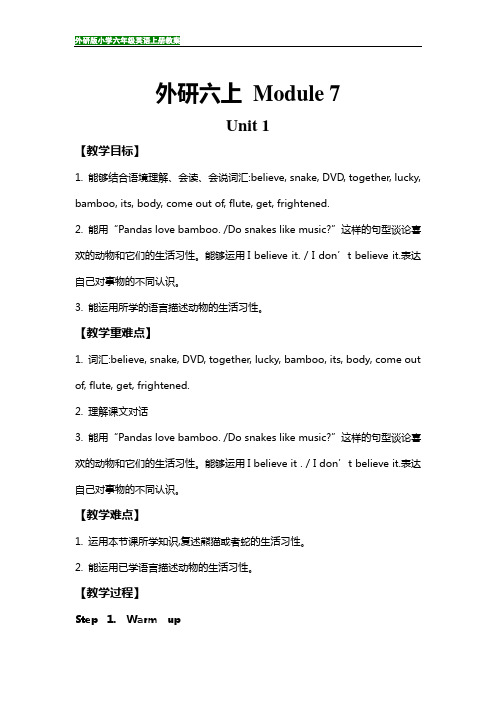
外研六上Module 7Unit 1【教学目标】1. 能够结合语境理解、会读、会说词汇:believe, snake, DVD, together, lucky, bamboo, its, body, come out of, flute, get, frightened.2. 能用“Pandas love bamboo. /Do snakes like music?”这样的句型谈论喜欢的动物和它们的生活习性。
能够运用I believe it. / I don’t believe it.表达自己对事物的不同认识。
3. 能运用所学的语言描述动物的生活习性。
【教学重难点】1. 词汇:believe, snake, DVD, together, lucky, bamboo, its, body, come out of, flute, get, frightened.2. 理解课文对话3. 能用“Pandas love bamboo. /Do snakes like music?”这样的句型谈论喜欢的动物和它们的生活习性。
能够运用I believe it . / I don’t believe it.表达自己对事物的不同认识。
【教学难点】1. 运用本节课所学知识,复述熊猫或者蛇的生活习性。
2. 能运用已学语言描述动物的生活习性。
【教学过程】Step 1. Warm up1.GreetingT: Hi, boys and girls.Ss: Hi, Ms. He.T: How are you today?Ss: I’m fine, thank you. And you?T: I’m fine, too. Thank you.2. Guessing game.T: Boys and girls. Look, last week, I went to the zoo with my daughter. T here are many animals in the zoo. Now, Let’s guess what are they?S1: They are birds.T: That’s right. Birds are cute. Can you say something about birds?S1: They are…S2: They are…S2: They are/eat…T: You all did a good job. Big hands for them. Now, let’s guess the next animals.S1: They are dogs.T: Bingo, what do you think about dogs?S1: They are…S2: They are …S3: They eat…T: Well down. Praise them, please. Boys and girls. There is a kind of animals, they have got long tails. They climb trees very fast. They like banana s. What are they?S1: They are monkeys.T: Bingo. You are smart. Come here. You read the riddle and ask your cla ssmates what they are?S1: There is a kind of animals. They are long. They have got small heads. They haven’t got legs. What are they?S2: They are snakes.S1: You are right. (引导生生评价)T: Good job. Boys and girls, look here. This is a snake.Ss: Snake. Snake.T: a, a, ei, ei, ei, lake, cake, snake. Now Let’s guess the last animals. XXX,Come and read the riddle .S2: There is a kind of animals, they are black and white. They love bamb oo. They live in China. What are they?S3: They are pandas.S2: You are right. (引导生生评价)T: Well done, Boys and girls, pandas love .... Yes, bamboo, bamboo, b æb æm, oo u bu.Ss: Bamboo3. Divide into groups and PK.T: Today, we have a competition. Group one,you’re pandas team. Group two,you are snakes team. Let’s PK. I have got a present for the winner. It’s a DVD. What’s it about? Let’s enjoy it. (播放熊猫视频)Step 2Presentation1. 学习怎样描述熊猫习性。
从文本走向生成——《牛津高中英语》Module7Unit3Reading教学设计
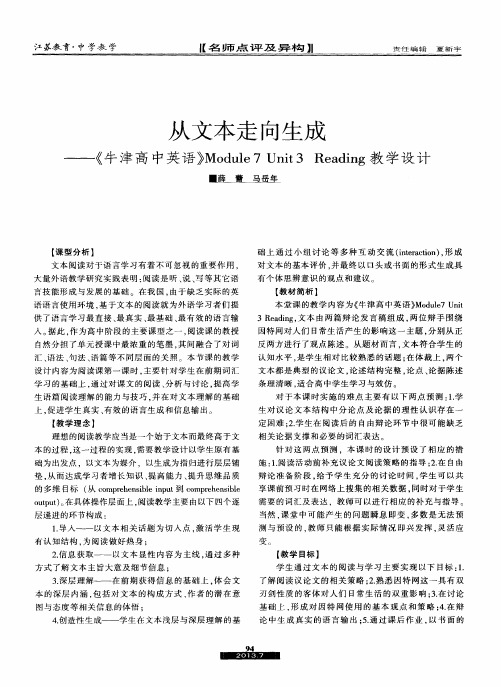
基础 上 , 形 成对 因特 网使用 的基本 观点 和策略 ; 4 . 在 辩
论 中 生 成 真 实 的语 言 输 出 ; 5 . 通过 课后作 业 , 以书 面 的
形 式 巩 固课 堂 上 的 口头 输 出 , 并 以此 进 一 步 认 知 合 理 使 用 因特 网 的 重要 性 和 相 关 建议 。
3 R e a d i n g , 文本 由两篇辩论 发言稿组成 , 两 位 辩 手 围绕 因特 网对 人 们 日常 生 活 产 生 的 影 响 这 一 主 题 , 分 别 从 正
人。 据此 , 作为高中阶段的主要课 型之一 , 阅读课的教授
自然 分 担 了 单 元授 课 中最 浓 重 的 笔 墨 。 其 间 融 合 了对 词 汇、 语法 、 句法 、 语 篇 等 不 同 层 面 的 关 照 。 本 节 课 的教 学 设 计 内容 为 阅读 课 第 一 课 时 , 主 要 针 对 学 生 在 前 期 词 汇 学 习 的基 础 上 。 通 过 对 课 文 的阅 读 、 分析与讨论 , 提 高 学
言技 能形 成 与发 展 的基 础 。在 我 国 , 由 于缺 乏 实 际 的 英 语 语 言使 用 环 境 . 基 于文 本 的 阅读 就 为外 语 学 习 者们 提 供 了 语 言学 习最 直 接 、 最真实 、 最基础 、 最 有 效 的语 言 输
【 教材简析 】 本堂课 的教学 内容为《 牛津 高中英语 > > Mo d u l e 7 U n i t
础 上通过 小组 讨论 等 多种互 动交 流 ( i n t e r a c t i o n ) . 形 成 对文本的基本评价 , 并 最 终 以 口头 或 书 面 的 形 式 生 成 具 有 个 体 思 辨 意 识 的 观 点 和建 议 。
广州版六年级上册英语教案 Module3 Unit7
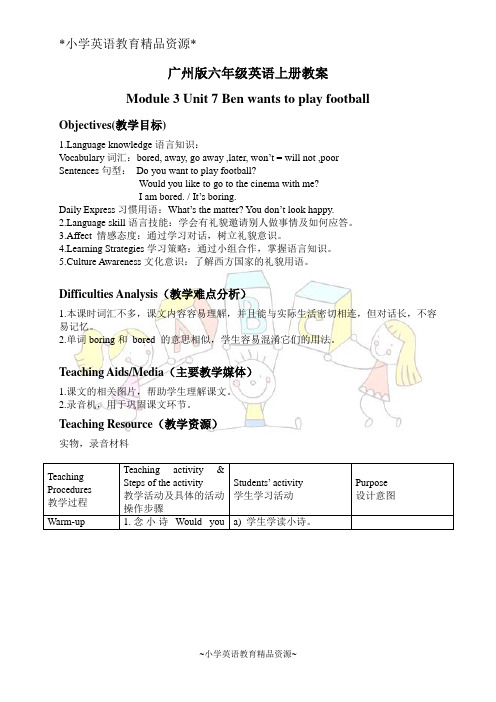
广州版六年级英语上册教案Module 3 Unit 7 Ben wants to play football Objectives(教学目标)nguage knowledge语言知识:V ocabulary词汇:bored, away, go away ,later, won’t = will not ,poorSentences句型:Do you want to play football?Would you like to go to the cinema with me?I am bored. / It’s boring.Daily Express习惯用语:What’s the matter? You don’t look happy.nguage skill语言技能:学会有礼貌邀请别人做事情及如何应答。
3.Affect 情感态度:通过学习对话,树立礼貌意识。
4.Learning Strategies学习策略:通过小组合作,掌握语言知识。
5.Culture Awareness文化意识:了解西方国家的礼貌用语。
Difficulties Analysis(教学难点分析)1.本课时词汇不多,课文内容容易理解,并且能与实际生活密切相连,但对话长,不容易记忆。
2.单词boring和bored 的意思相似,学生容易混淆它们的用法。
Teaching Aids/Media(主要教学媒体)1.课文的相关图片,帮助学生理解课文。
2.录音机,用于巩固课文环节。
Teaching Resource(教学资源)实物,录音材料Teaching Procedures 教学过程Teaching activity &Steps of the activity教学活动及具体的活动操作步骤Students’ activity学生学习活动Purpose设计意图Warm-up 1.念小诗Would you a) 学生学读小诗。
外研版八下module7 unit3教学设计课件授课

常见并列连词:
1.表并列关系: and,not only…but also,neither…nor 2.表选择关系:or,otherwise,or else,either 3.表转折关系:but,yet,still ,however 4.说明原因:for 5.表示结果:so
1. 表并列 用来连接两个并列概念的连接词有
1.Jointhetwopartsofthesentenceswithand,buto ror.
1.IwouldliketogotoEngland… 2.Youshouldweararaincoat... 3.Youcangobyplane... 4.Ididnotbringmysunglasses 5.Ihaveboughtmyticket... 6.Youcantaketwobags...
Continuetoaddsentences.
4.Readtheadvertisement.
WanttolearnaboutthecultureintheUK? Comeandjoinus!
•LetaBritishfamilyteachyouallaboutthe cultureintheUK. •Studentsstudytogetheringroups. •After-schoolactivitiesforstudents. •Forstudentsfromallovertheworld. •Cost:£800forafour-weekcourse.
•either…or… Eitheronegoesforwardorhewillbeleftbehi nd. 不进则退. HeeitherwatchesTVorreadsbooksinthee vening. 晚上他不是看电视,就是看书.
2019秋外研版七年级英语上册教案:Module 7 Computers Unit 3 Language in use
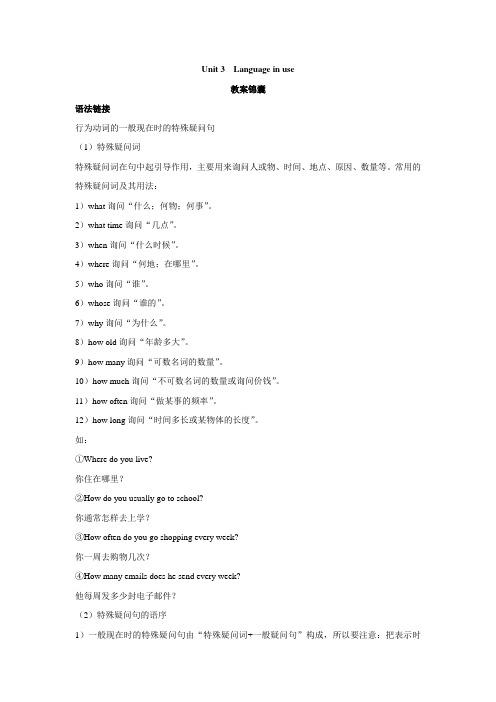
Unit 3 Language in use教案锦囊语法链接行为动词的一般现在时的特殊疑问句(1)特殊疑问词特殊疑问词在句中起引导作用,主要用来询问人或物、时间、地点、原因、数量等。
常用的特殊疑问词及其用法:1)what询问“什么;何物;何事”。
2)what time询问“几点”。
3)when询问“什么时候”。
4)where询问“何地;在哪里”。
5)who询问“谁”。
6)whose询问“谁的”。
7)why询问“为什么”。
8)how old询问“年龄多大”。
9)how many询问“可数名词的数量”。
10)how much询问“不可数名词的数量或询问价钱”。
11)how often询问“做某事的频率”。
12)how long询问“时间多长或某物体的长度”。
如:①Where do you live?你住在哪里?②How do you usually go to school?你通常怎样去上学?③How often do you go shopping every week?你一周去购物几次?④How many emails does he send every week?他每周发多少封电子邮件?(2)特殊疑问句的语序1)一般现在时的特殊疑问句由“特殊疑问词+一般疑问句”构成,所以要注意:把表示时间、地点或方式的特殊疑问词放在句首,疑问词后面句子的结构顺序与一般疑问句的语序一致。
如:①How much milk do you have every day?你每天喝多少牛奶?②What do they like for breakfast?他们早餐喜欢吃什么?2)疑问词本身作句子主语时,后面语序不变。
如:①Who can help me?谁能帮我?②Which is your favourite?哪个是你最喜欢的?③What makes you so happy today?今天什么事让你这么高兴?(3)特殊疑问句的答语特殊疑问句不能用yes或no来回答,而要根据具体情况,用陈述句回答。
- 1、下载文档前请自行甄别文档内容的完整性,平台不提供额外的编辑、内容补充、找答案等附加服务。
- 2、"仅部分预览"的文档,不可在线预览部分如存在完整性等问题,可反馈申请退款(可完整预览的文档不适用该条件!)。
- 3、如文档侵犯您的权益,请联系客服反馈,我们会尽快为您处理(人工客服工作时间:9:00-18:30)。
Module7Unit3 The world onlinePart One Reading一词组翻译1. 向……求助2. 受某人支配3. 更有甚者,更为重要的是4. 退学,辍学;退出,脱离5. 仔细搜寻6. 一串,一束;大量,大批7. 牢记8. 把……考虑在内9. 给某人树立好的榜10. 属于11. 是……的缩写;代表12. 有关系;有影响13 与他人保持联系14 天气预报15 包价旅游16 学术研究17 上交论文18 传统的参考资料19 最新的20 搜索引擎21 主题目录22 因为缺乏能力23 做出你自己的决定24 网页二语言点归纳1 brand n. 品牌;类型崭新的2 sourcethe source of a river or streamresource n. 丰富的自然资源3 turn to somebody/somethingturn on turn off turn toturn out turn into turn overturn in turn up turn downturn around turn left /rightin turn in return take turns It’s one’s turn to do sth.填空:1. Those who were once for him have turned _____ him.2. Turn _____ everything captured(缴获的).3. I'm going to turn my garage _____ a playroom for the children.4. Be sure to turn _____ the lights when you leave the room.5. Shall I turn _____ the bath water for you?6. He turned the meat _____ in the pan(平底锅).7. They always turn _____ me when they are in trouble.8. His attention turned _____ the pretty young girl.9. Turn the radio _____ a little. I can scarcely hear the program.10. He turned the coat collar(衣领) _____ because of the wind.11. Something will turn _____ to get you out of the difficulty.12 In the dark street there was no one she could turn for help.4 abundant adj.大量的,充裕的abandon v.[教材原句]With the touch of a button or the click of a mouse, a student will find abundant information from the largest libraries and museums in the world at his or her command.(1)be abundant in =be rich in富有……(2) n. 大量,丰富,充裕in abundancean abundance of例句1 Our country has a large population, vast territory and abundant resources.2 At the feast there was an abundance of food and drink3. In the Mediterranean seaweed is so abundant and so easily harvested that it is never of great _.A fareB paymentC worthD expense4. The writer was so ________ in her work that she didn’t notice him enter the room.A absorbedB abandonedC focusedD centered5. Many social problems are accused by the uneven ____ of wealth.A. equalityB. distributionC. abundanceD.quantity5 command命令;控制;掌握[经典例句]For the first time in years, she felt in command of her life.(1) in command of take command ofhave a good command of at sb.'s command(2) command sb.to do sth.command that ...命令……(从句谓语用“should+动词原形”,should可省略).1. Unless you have a good _______over your temper, you will offend many people.A. orderB. commandC. guardD. contrast2. The boy has _______an unforgivable error.A. producedB. conductedC. commandedD. committed3. This hotel ____ $ 60 for a single room with bath.A claimsB demandsC pricesD charges4 He commanded that the students the classroom before he returns.A didn’t leaveB wouldn’t leaveC needn’t leaveD not leave5 I request that he an hour earlier.A came Bcomes C will come D come6 claim vt. 宣称,断言;索取,认领n. 声明,断言;索赔,索款1.He claimed at yesterday's party.A.having been badly treatedB.to have been badly treatedC.being treated badlyD.to be treated badly2 Now they are returning to claim what was theirs3 Heart disease is the biggest killer, claiming 180,000 lives a year.4 Lost property can be claimed between 10a.m.and 4p.m.5.Thanks for the advice, but this is something I have to _______ out myself.A. fulfillB.identifyC.figureD.claim7 assumption假定,假设make an assumption that v .assume sb/sth. to be……. 假定/假设…为……. It is assumed that…….. 被认为………..make an assumption that……. 假定/认为 *assuming conj. 假定(设)(引导条件状语从句)1)许多人认为贫穷仅仅存在于第三世界。
A lot of people________ _______ _______________that poverty only exists in the Third World.____ ___ ______________ ____________poverty only exists in the Third World.2) ________ that you are rich in wealth, what will you do then?A. Assume B, Assuming C. Assumed D. to assumed3. He was proud of being chosen to participate in the game and he _____us that he would try as hard as possible.A insuredB guaranteedC assumedD assured8 diverse adj. 多种多样的,形形色色的n. 多种多样,多样性various varieties of a variety of different all kinds of vary v.9 correspond v. 通信;相一致,符合;相当于[教材原句]What is more, people who are disabled and must stay in their homes can correspond and communicate with others around the globe who have similar interests.correspond to/with correspond with10 globe n. 世界,全球;地球仪;球体adj.11 avenue途径,手段;大街1.pursue new avenues of economic cooperation2.walk down an avenue3.No sooner was one promising avenue closed than a hundred more opened.4.We must explore every avenue before admitting defeat.近义词:access, approach, course, ; passage, path, road, route, way alley, lane track clue channel12 address v. 探讨,解决,处理;向……说话;称呼(某人)address a meeting address oneself toaddress sth to sb be addressed asfixed address1. The boy has _____ a fine knowledge of geography by careful study.A. requiredB. inquiredC. acquiredD. addressed2. We must ___ ourselves to the problem of traffic pollution.A. deal withB. work outC. solveD. address3.The professor will _______ the meeting tomorrow.A. speakB. addressC. talkD. say4He is due to address a conference on human rights next week.13 evaluate v. 评估,评价n.evaluate the old furniture evaluate oneself近义词:evaluate, assess, estimate, rate, value comment remark14 accuracy n.准确性;精确度adj.15 up to date最新的;现代的;时髦的up-to-date adj. in fashion in datebe up to 1 2 3 4It’s up to you. ups and downs16 weakness n. 缺点,不足;弱点;虚弱,衰弱adj. v.strengths and weaknessesadmit one's weaknessphysical weakness We all have our weaknesses.He has a weakness for detective stories.他特别爱读侦探小说17 false adj.虚假的,伪造的;错误的;人造的false position 错误的立场false teeth 假牙false passport 伪造的护照近义词false, artificial, fake, mistaken ,wrong error18 reference n.参考,查阅;提到,谈及;介绍信,介绍人reference bookfor future reference make reference to 谈及涉及refer to look up consultThe figures in the left-hand column refer to our sales abroad .On AIDS DAY,the minister of HEALTH DEPARTMENT demanded that the problems_______paid special attention to.A.referred to beingB.referred to beC.refer to beingD.refer to be19 drop out退学,辍学;退出,脱离drop out of drop in on sb.drop in at a place drop by/indrop off20 withdraw v. 脱离(社会),不与人交往;撤回;取(款)[教材原句]This study shows that people who spend too much time on the Internet tend to withdraw from the people and the world round them.The keen competition in on-line game industry forced the firms with poor performance to _____ from the market.A. withdrawB. benefitC. resultD. remove21 conference, congress, assembly, meeting, , council, convention, gathering seminar22 adj 直言的,坦率的;清楚明白的,易懂的Part Two Word Power1 alarm v. 使担心,使害怕,使警觉n. 惊恐忧虑警报闹铃[教材原句]This is an unfortunate aspect of the Internet that alarms me1 Her high temperature alarmed the doctors.2 I turned in alarm as the wind blew the door open.3 ring/give/set/sound /raise the alarm4 at an alarming rate5 an alarming increase in violent crime2 inventor n. 发明者,发明家v. n.create find discover3 abandon v. 放弃;抛弃,舍弃abundant adj.[教材原句]They would not have achieved their success if they had abandoned their dreams.(1)abandon oneself to ...沉溺于……;纵情于……abandon doing sth. 放弃做某事(2)with abandon 放任地;放纵地;纵情地(3)abandoned adj. 废弃的;被遗弃的1 Jonathan received a promotion to the role of assistant manager and is the youngest person to ___________ that post in this international company.A.adopt B.seek C.occupy D.abandon2 It's not easy for him to _ __smoking. A. drop B. abandon4 appointment n. 约会,预约;任命,委任make an appointment keep an appointmen by appointmentappoint v. appoint sb. as appoint sb. to sp. appoint sb. to do sththe appointed time 约定的时间Part Three Project1 classify v. 分类,归类n. divide separateAdvertising companies are always having to think up new ways to products.A. designB. classifyC. promoteD. identifyIt has been argued by some that gifted children should be grouped in special classes, The 1 has been on the beli ef that in regular classes these children are held back in their intellectual (智力的) growth by 2 situation that has designed for the 3 children1. A. principle B. theory C. arguments D. classification2. A. designing B. grouping C. learning D. living3. A. smart B. curious C. mature D. average2 type v. (用计算机或打字机)打字打字机打字员典型的tyre n.category kind sort species type3 qualification n. 资格,资历v.beautify,simplify,purify,identify,qualify,modify,satisfy terrify4 comb v. 仔细搜索;梳理(头发);n. 梳子comb your haircomb(through)something(for) comb the woods for the missing boy1. People _______ round to get a better view of famous film stars.A. crowdedB. combedC. countedD. come running5 specific adj. 具体的,明确的;特定的,独特的v. specify adv. specificallyconcrete definite abstract general6 bunch n. 串,束v.a bunch of一串,一束;大批,大量 a bunch of flowers/keys/grapes/questions in bunches7 relevant adj. 紧密相关的,切题的;有价值的,有意义的n. relevance adv. be relevant toThese issues are directly relevant to the needs of slow learners.Museums should have a more involved or relevant public role.8 bother vi.& vt.花费时间、精力(做某事);打扰,给某人造成麻烦n.麻烦[教材原句]Usually, people try to put correct information on the Internet, but not every person bothers to read over their own writing and make corrections.bother about/with sth. bother to do sth. bother sb. about/with sth.give sb. any/a lot of bother save sb./yourself the bother of doing sth.I am too busy to bother about fixing it now .Unfortunately he didn’t bother to check the exact wording of the contract before he signed it.Danny ,stop bothering me while I am trying to work.9 plus n.加号;优势,长处prep. 加以及和adj. 零度以上的minus n.减号;负号;缺点prep. 减没有缺乏adj. 零度以下的负的. 1 The loud noises from that factory almost _____ me mad.A. multiplyB. causedC. droveD. turned2 Hospital staff burst into cheers after doctors completed a 20-hour operation to haveone-year-old twins at the head.A.isolatedB.separatedC.dividedD.removed10 acknowledge v.承认,认可;感谢n.[教材原句]When you are finished, you should always acknowledge where you got your data by attaching a list of the websites you got your information from.例句And it speaks to those who are courageous enough to acknowledge that life is rife with pain and conflict, just as it's filled with compassion and joy.It is now generally acknowledged that he was innocent.Lasalle is widely acknowledged as the world’s greatest living authority on Impressionist painting.The author wishes to acknowledge the assistance of the Defense Department.近义词acknowledge, admit,, confess, recognize经典句型:1 find oneself doing 发现自己正在做……【课本原句】When you learn a little bit about a new topic,you may find yourself wanting to know more. When the old man came to,he found himself lying in hospital.Finally,I found myself standing at the top of the mountain.【联想拓展】find后接复合宾语(1)“find oneself+宾语补足语”指(不知不觉地)发现自己处于某种情况中,可用形容词、介词短语、现在分词、过去分词作宾补。
